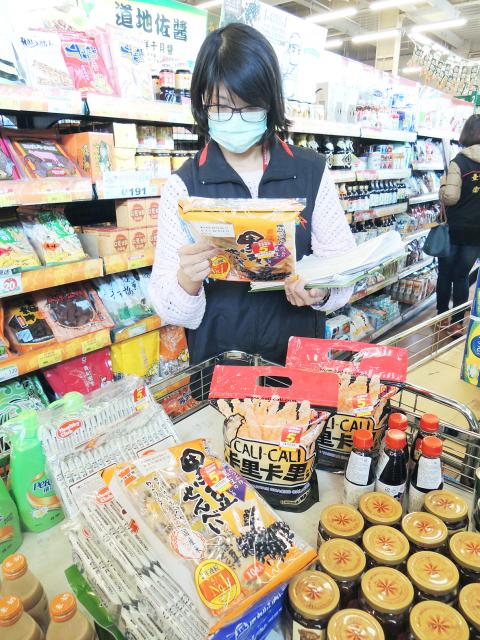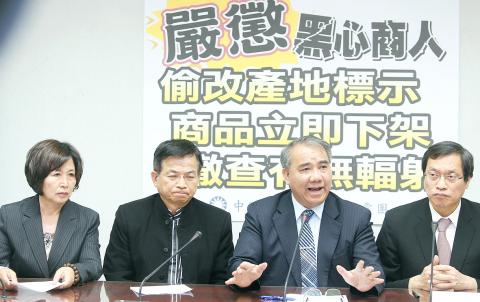Minister of Health and Welfare Chiang Been-huang (蔣丙煌) yesterday acknowledged that the ministry is mulling lifting its ban on imports of food products from five Japanese prefectures near the Fukushima Dai-ichi nuclear power plant, following discoveries that more than 250 food products manufactured in the five areas have illegally entered the country with false origin labeling.
Chiang made the remarks when pressed by Democratic Progressive Party (DPP) Legislator Lin Shu-fen (林淑芬) at a meeting of the legislature’s Social Welfare and Environmental Hygiene Committee yesterday morning to confirm reports that the government is deliberating relaxing the ban due to mounting pressure from the Japanese government.
“It is true that Japan has made such a request, actually more than once over the years since the 2011 Fukushima Dai-ichi meltdown. It stressed that its nation’s [food] products were safe, and to my knowledge, many other countries have agreed to similar requests,” Chiang said.

Photo: Tsai Shu-yuan, Taipei Times
Chiang said that given Taiwan’s ban on food products from the five prefectures was relatively stringent and that Japan has proposed the idea on multiple occasions, “the ministry is obligated by international custom to deliberate on the proposal’s feasibility.”
The government imposed the ban on food items from Fukushima, Ibaraki, Tochigi, Gunma and Chiba prefectures in March 2011.
It has also subjected nine categories of food products from other parts of Japan to batch-by-batch border inspections — fresh vegetables and fruits; frozen vegetables and fruits; fresh aquatic products; frozen aquatic products; baby formula; dairy products; seaweed; tea leaves; and drinking water.

Photo: CNA
The minister’s statements came at a particularly sensitive time for the Food and Drug Administration (FDA), which has been accused of deliberately delaying the publication of its findings that a dozen Taiwanese companies had been importing hundreds of food products from the five prefectures with fake origin labels.
A press release issued by the New Taipei City Government’s Public Health Department on Tuesday evening said that the FDA recently found that two soy sauce products imported by Taipei-based Sheng Yu Trading Co (盛裕貿易) on Feb. 4 were labeled as being produced in Tokyo, but were actually manufactured in Chiba and Gunma.
However, the administration did not take any action until Thursday last week, when it accompanied health officials in raiding the factories of implicated companies. The FDA released the findings late on Tuesday.
As of 12pm yesterday, a total of 294 food products imported from 12 firms have been ordered off the shelves over their allegedly adulterated place of origin labels, including Kirin’s (午後紅茶) Afternoon Tea Straight Tea, Milk Tea and Lemon Tea beverages, Nissin Food Products Co’s cup noodles and Japanese confectioner Morinaga’s six cookie and sweet products.
The falsified Chinese labels, which were reportedly simply attached on top of the original Japanese-language ones, claimed that they were manufactured in Tokyo, Osaka, Kobe, Okayama or other regions far from the Fukushima Dai-ichi nuclear plant.
However, 108 of the products were produced in Gunma, 74 were from Ibaraki, 48 from Chiba, 45 from Tochigi and 19 from Fukushima. The FDA has sent all the potentially questionable items to the Atomic Energy Council for testing, of which 193 were found to contain no radioactive residue as of yesterday.
During the committee meeting, Lin said she was unsatisfied with Chiang’s comments, adding that Taiwan’s ban is far from strict, since China has not only banned all food imported from 10 high-risk Japanese prefectures, but also demanded a radiation detection report and a government-issued place of origin for food items from other areas of the country.
“Taiwan only imposed a food import ban on five prefectures and the ministry has used every excuse it could think up to procrastinate in implementing a draft regulation that requires importers of the above nine types of products to provide a country of origin certificate and a radiation assessment report issued by the Japanese government,” Lin said.
Lin said that nearly five months had passed since the FDA started seeking public opinion over the proposal in late October last year, a process that usually takes just two months.
FDA Director-General Chiang Yu-mei (姜郁美) pledged to publish the draft regulation within two weeks, adding that the new rule is expected to take effect in late June at the latest after both sides finalize the format of the required official documentation.
Meanwhile, the Chinese Nationalist Party (KMT) caucus called for immediate removal of potentially radioactive Japanese food products from the shelves, with one lawmaker proposing a boycott of all Japanese foodstuffs.
KMT Legislator Su Ching-chuan (蘇清泉), at a news conference held by the caucus that Chiang Yu-mei attended, proposed condemning unscrupulous companies and the Japanese government, demanded a pre-emptive measure of pulling all Japanese food products off shelves and that all Taiwanese to boycott Japanese food products.
KMT Legislator Wu Yu-jen (吳育仁) asked why Japan had failed to provide official certification on the place of origin for food exported to Taiwan, when it apparently had been doing so to other countries, including China.
Additional reporting by Alison Hsiao

MAKING WAVES: China’s maritime militia could become a nontraditional threat in war, clogging up shipping lanes to prevent US or Japanese intervention, a report said About 1,900 Chinese ships flying flags of convenience and fishing vessels that participated in China’s military exercises around Taiwan last month and in January last year have been listed for monitoring, Coast Guard Administration (CGA) Deputy Director-General Hsieh Ching-chin (謝慶欽) said yesterday. Following amendments to the Commercial Port Act (商港法) and the Law of Ships (船舶法) last month, the CGA can designate possible berthing areas or deny ports of call for vessels suspected of loitering around areas where undersea cables can be accessed, Oceans Affairs Council Minister Kuan Bi-ling (管碧玲) said. The list of suspected ships, originally 300, had risen to about

DAREDEVIL: Honnold said it had always been a dream of his to climb Taipei 101, while a Netflix producer said the skyscraper was ‘a real icon of this country’ US climber Alex Honnold yesterday took on Taiwan’s tallest building, becoming the first person to scale Taipei 101 without a rope, harness or safety net. Hundreds of spectators gathered at the base of the 101-story skyscraper to watch Honnold, 40, embark on his daredevil feat, which was also broadcast live on Netflix. Dressed in a red T-shirt and yellow custom-made climbing shoes, Honnold swiftly moved up the southeast face of the glass and steel building. At one point, he stepped onto a platform midway up to wave down at fans and onlookers who were taking photos. People watching from inside

Japan’s strategic alliance with the US would collapse if Tokyo were to turn away from a conflict in Taiwan, Japanese Prime Minister Sanae Takaichi said yesterday, but distanced herself from previous comments that suggested a possible military response in such an event. Takaichi expressed her latest views on a nationally broadcast TV program late on Monday, where an opposition party leader criticized her for igniting tensions with China with the earlier remarks. Ties between Japan and China have sunk to the worst level in years after Takaichi said in November that a hypothetical Chinese attack on Taiwan could bring about a Japanese

STREAMLINED: The dedicated funding would allow the US to transfer equipment to Taiwan when needed and order upgraded replacements for stockpiles, a source said The US House of Representatives on Thursday passed a defense appropriations bill totaling US$838.7 billion, of which US$1 billion is to be allocated to reinforcing security cooperation with Taiwan and US$150 million to replace defense articles provided to the nation. These are part of the Consolidated Appropriation Act, which the US House yesterday passed with 341 votes in favor and 88 against. The act must be passed by the US Senate before Friday next week to avoid another government shutdown. The US House Committee on Appropriations on Monday unveiled the act, saying that it allocates US$1 billion for the Taiwan Security Cooperation Initiative